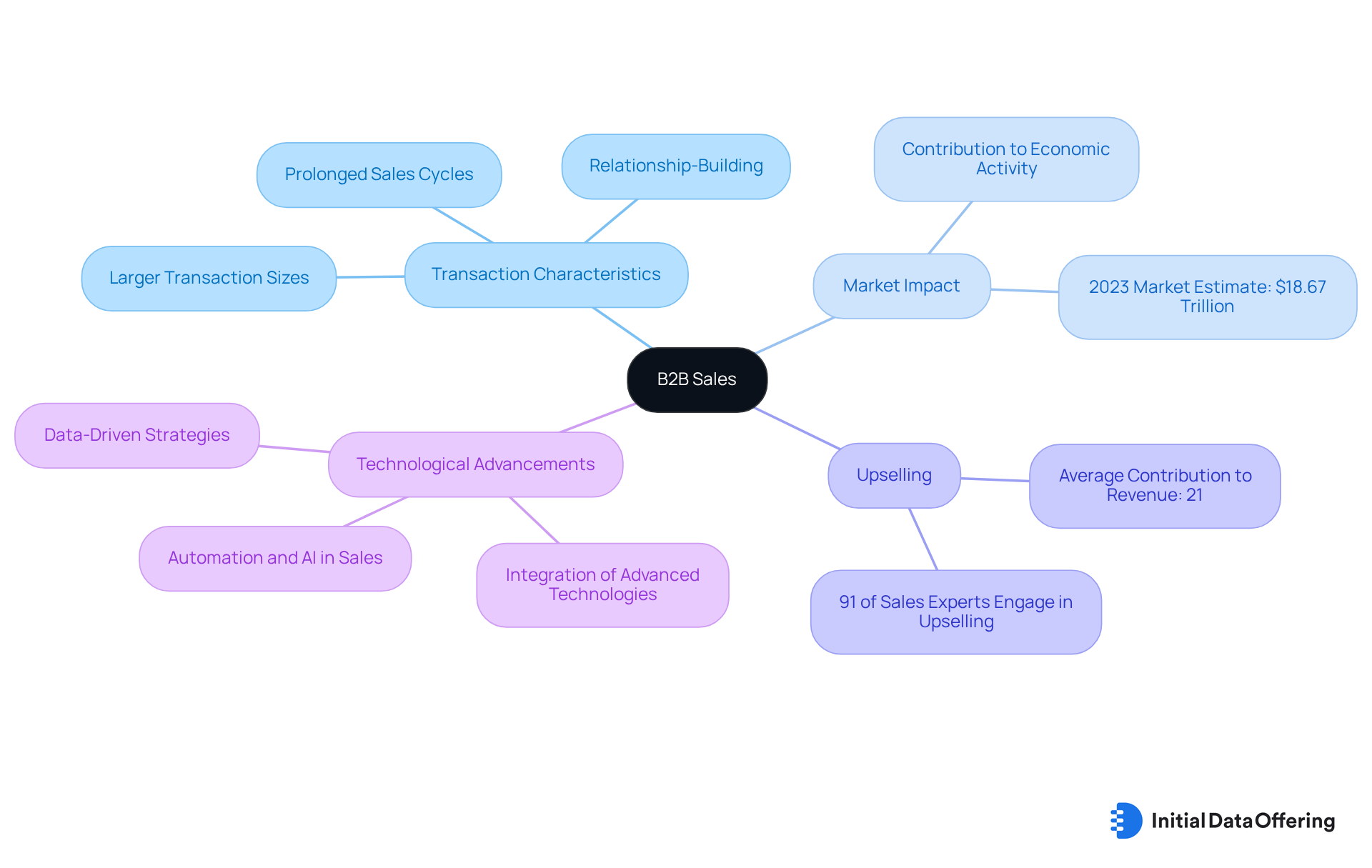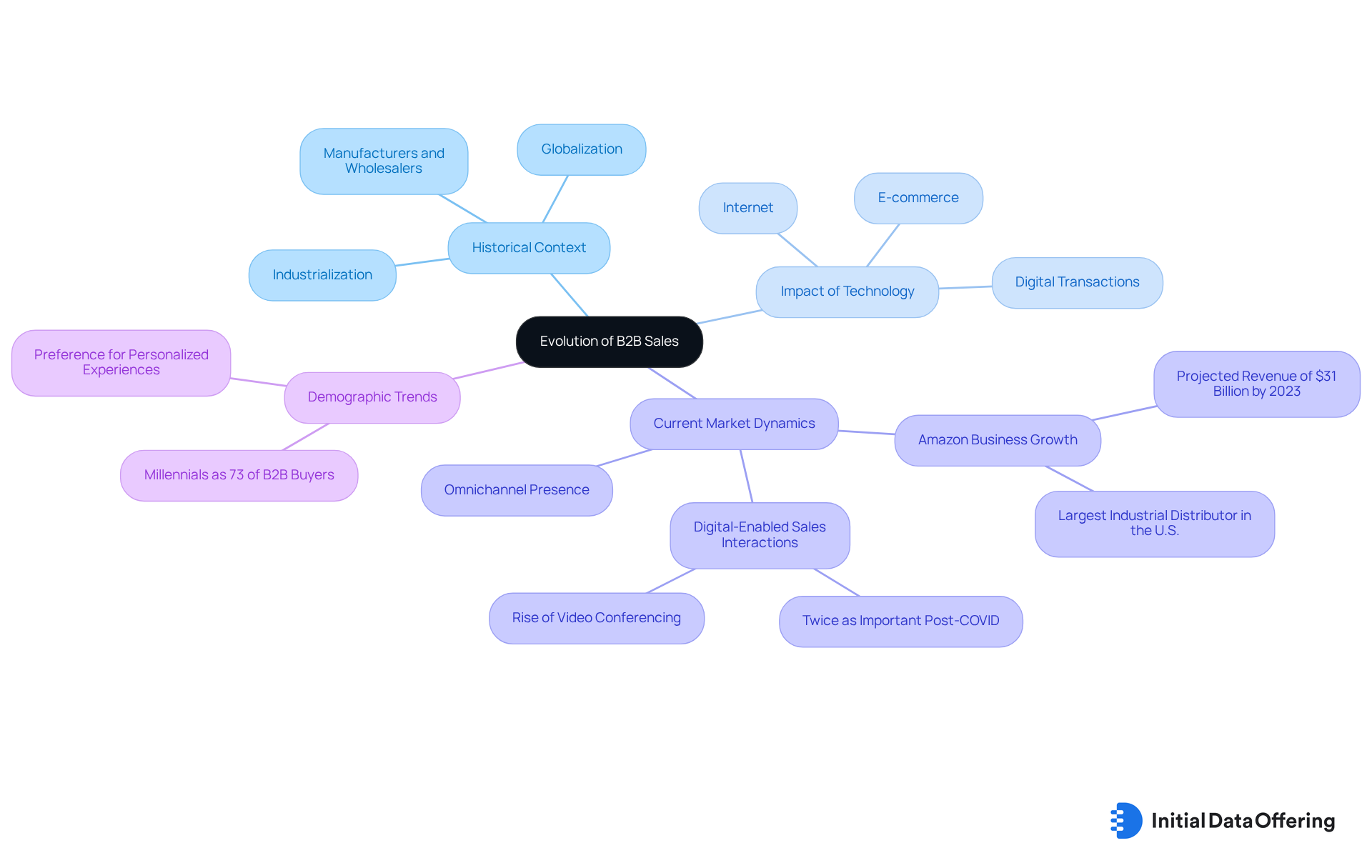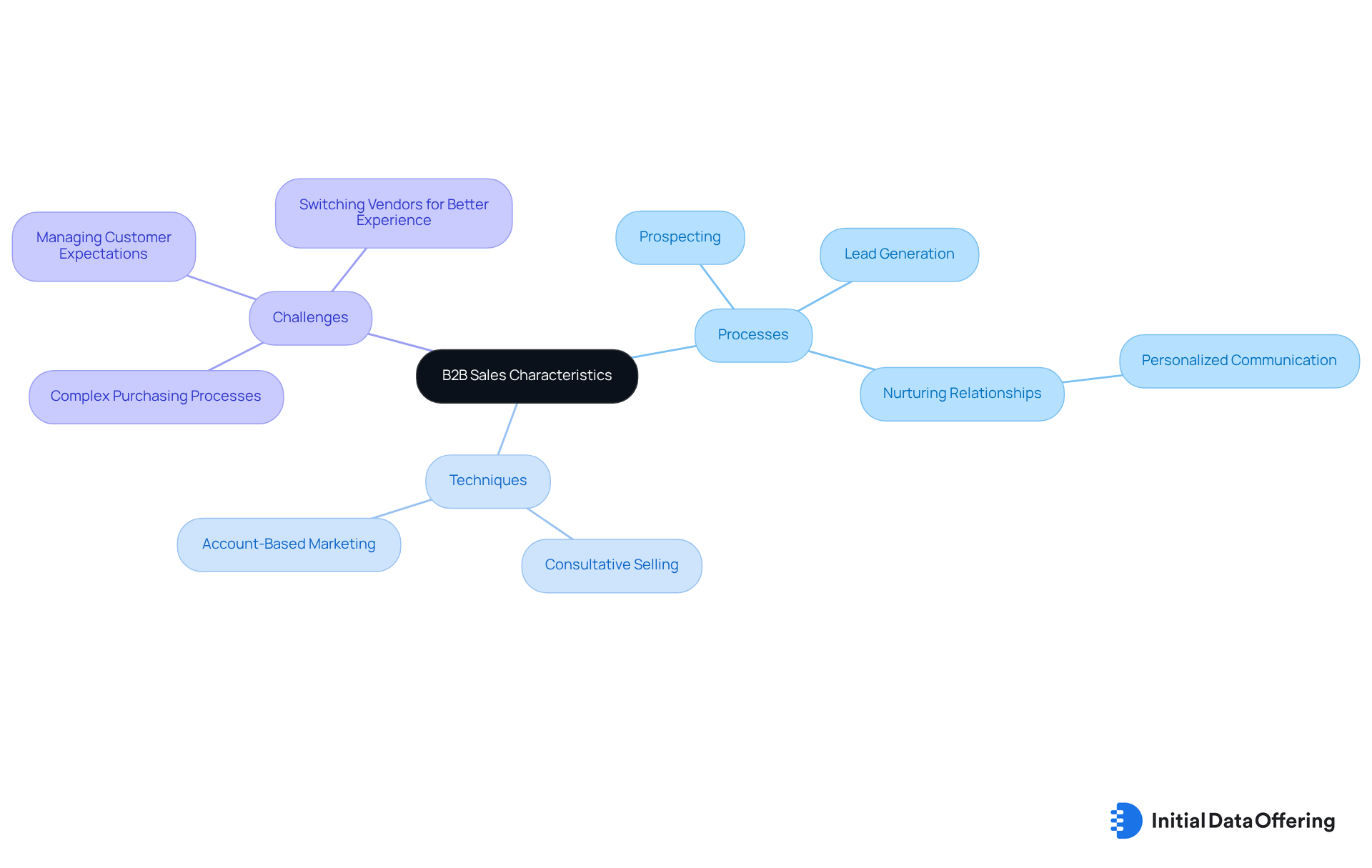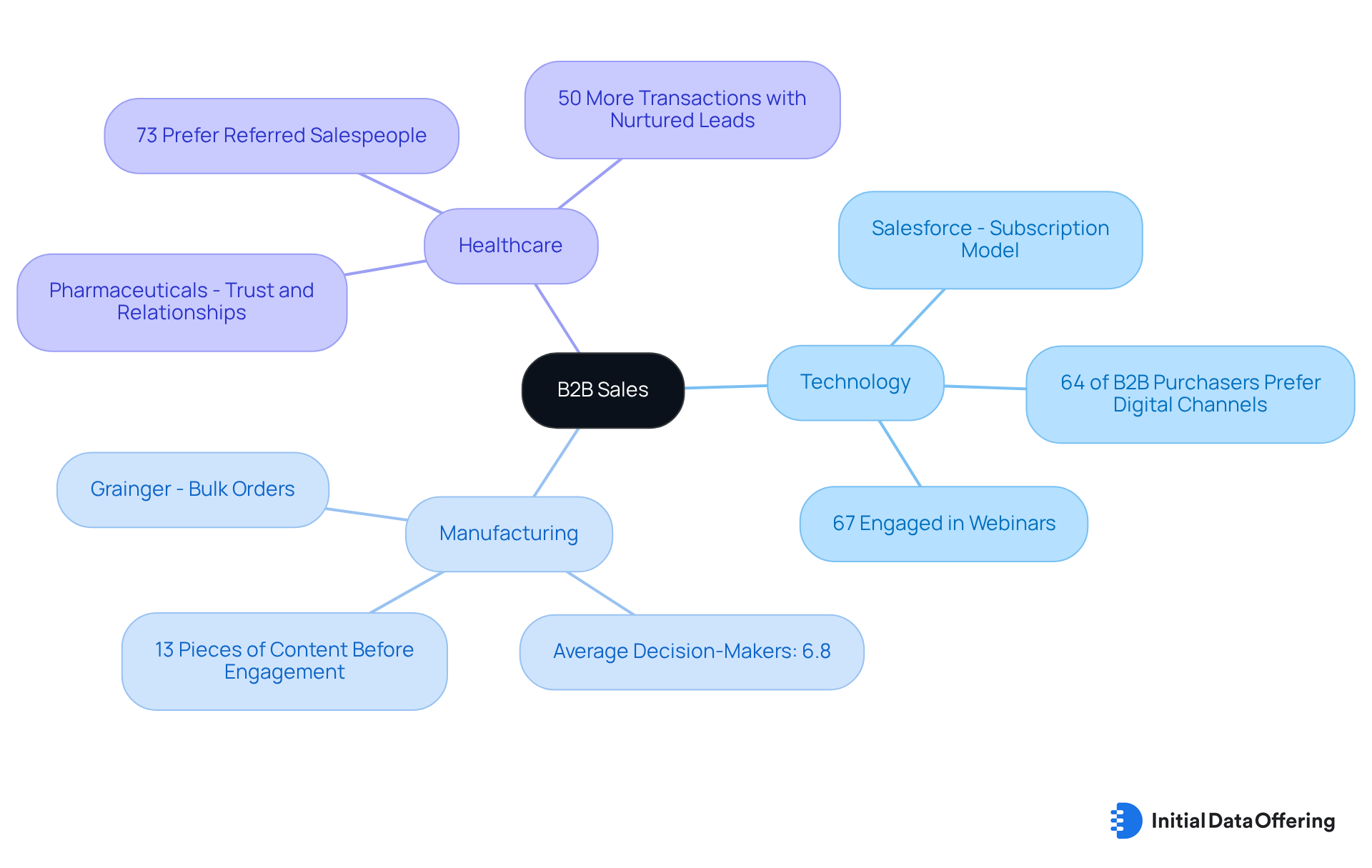What Does B2B Sales Mean? Key Characteristics and Evolution Explained

What Does B2B Sales Mean? Key Characteristics and Evolution Explained
Overview
B2B sales, or business-to-business sales, represent transactions where one company sells products or services to another. These transactions are characterized by:
- Larger transaction sizes
- Longer sales cycles
- A strong emphasis on relationship-building
The significance of B2B sales in the economy cannot be overstated; they contribute approximately $18.67 trillion in market activity. This substantial figure highlights the critical role that B2B transactions play in driving economic growth.
Moreover, the evolution of B2B strategies in response to technological advancements and changing buyer behaviors underscores the dynamic nature of this sector.
How can businesses adapt their sales strategies to leverage these advancements? Understanding these trends is essential for companies aiming to thrive in a competitive marketplace.
Introduction
B2B sales, or business-to-business transactions, are crucial to the global economy, boasting an estimated market value of $18.67 trillion in 2023. This landscape is characterized by:
- Longer sales cycles
- A strong emphasis on relationship-building
These are essential features of B2B transactions. The advantages of understanding these dynamics are significant:
- Companies can enhance their strategies to meet evolving buyer expectations
- Navigate competitive pressures effectively
Furthermore, the transformative impact of technology on these exchanges cannot be overstated. As organizations seek to drive sustainable growth and strengthen their market presence, they must consider how to effectively navigate the complexities of B2B sales.
How can businesses adapt their approaches to ensure success in this intricate environment? This question invites a deeper exploration of effective strategies and practices in B2B sales.
Define B2B Sales: Understanding the Concept and Its Importance
B2B transactions, or business-to-business exchanges, raise the question of what does B2B sales mean, as they involve dealings where one company offers products or services to another. This model contrasts with B2C (business-to-consumer) transactions, where companies sell directly to individual customers. Notably, B2B commerce typically features larger transaction sizes, prolonged sales cycles, and a strong emphasis on relationship-building.
The significance of B2B transactions is underscored by their considerable contribution to economic activity; in 2023, the B2B market was estimated at approximately $18.67 trillion. This figure illustrates the vital role B2B transactions play in facilitating the exchange of products, services, and solutions essential for organizational operations and growth. As companies increasingly rely on one another, understanding what does B2B sales mean becomes crucial for firms looking to enhance their market standing and achieve sustainable development.
Furthermore, 91% of B2B sales experts engage in upselling, contributing an average of 21% to company revenue. This statistic highlights the potential for expansion within this sector. Moreover, the integration of advanced technologies and data-driven strategies is transforming B2B transactions, allowing businesses to optimize their processes and improve customer satisfaction. This evolution underscores the necessity for companies to adapt and innovate within the B2B landscape to maintain competitiveness.
How can your organization leverage these insights to enhance its B2B strategies and drive growth?

Explore the Evolution of B2B Sales: Historical Context and Market Relevance
The development of B2B transactions can be traced back to the early days of commerce, where trade was conducted directly between manufacturers and wholesalers. Over the decades, industrialization and globalization have transformed B2B transactions, introducing complex supply chains and distribution networks. The emergence of technology, particularly the internet, has further revolutionized B2B commerce by facilitating digital transactions and e-commerce platforms. Today, B2B transactions are characterized by a blend of traditional relationship-building and modern digital strategies, reflecting the evolving needs of businesses in a competitive landscape.
For instance, the expansion of Amazon Business, projected to reach $31 billion in revenue by 2023, exemplifies how technology has reshaped B2B commerce dynamics. This transformation enables companies to tap into a vast marketplace of products and services. Moreover, the pandemic has accelerated the acceptance of digital commerce methods. A McKinsey study indicates that digital-enabled interactions have become at least twice as significant as they were prior to COVID. This evolution necessitates that companies not only adjust their marketing strategies but also harness data-driven insights to meet the expectations of a new generation of B2B purchasers. Notably, Millennials now represent 73% of B2B buyers, favoring personalized and efficient buying experiences.
Understanding what does B2B sales mean is crucial for businesses aiming to thrive in the current market landscape, especially since 64% of B2B marketers face budget and resource challenges. Furthermore, the significance of CRM systems for tracking customer interactions and the trend toward an omnichannel presence are vital considerations for adapting to buyer expectations. How can your organization leverage these insights to enhance its B2B strategy?

Identify Key Characteristics of B2B Sales: Processes, Techniques, and Challenges
B2B transactions are characterized by prolonged cycles, often lasting up to 8 months, and involve the participation of multiple decision-makers, typically averaging 10-11 stakeholders per purchasing group. This complexity underscores the importance of relationship-building, as 82% of professionals in commerce prioritize cultivating connections for success. The marketing process encompasses several stages, including:
- Prospecting
- Lead generation
- Nurturing relationships through personalized communication
Techniques such as consultative selling and account-based marketing are commonly employed to tailor solutions to the specific needs of business clients.
However, B2B sales encounter significant challenges, such as:
- Navigating intricate purchasing processes
- Managing customer expectations
A staggering 63% of B2B buyers are likely to switch vendors for a better customer experience, highlighting the necessity for companies to adapt their strategies to meet evolving market demands. Furthermore, with 91% of purchasers conducting thorough research prior to engaging with sellers, companies must ensure they provide valuable insights and content that resonate with prospective clients. Additionally, 60% of B2B buyers prefer to engage with companies that offer personalized recommendations based on their purchase history. Understanding what B2B sales mean, along with these essential traits and challenges, is crucial for organizations aiming to enhance their B2B selling approaches and foster sustainable growth.

Examine Real-World Examples of B2B Sales Across Different Industries
Real-world instances of B2B transactions provide insight into what does B2B sales mean across various sectors, demonstrating diverse approaches tailored to specific market demands. In the technology industry, Salesforce exemplifies effective B2B transactions by offering software solutions through a subscription model. This approach not only generates recurring revenue but also fosters long-term client relationships. This aligns with the trend where 64% of B2B purchasers prefer digital channels, illustrating what does B2B sales mean regarding the importance of accessibility and convenience in modern sales practices. Additionally, 67% of B2B purchasers have engaged in a webinar within the past year, further illustrating what does B2B sales mean in the context of the significance of digital engagement strategies.
In the manufacturing sector, companies like Grainger effectively serve businesses by prioritizing bulk orders and personalized service. Their strategy emphasizes the necessity of understanding client needs, especially considering what does B2B sales mean, as the average number of decision-makers involved in B2B purchases has risen to 6.8. Furthermore, the average B2B buyer interacts with 13 pieces of content before connecting with a brand, which illustrates what does B2B sales mean in terms of the complexity of the buyer's journey and the demand for customized marketing tactics.
The healthcare sector further illustrates the dynamics of B2B transactions, with pharmaceutical companies supplying medications to hospitals and clinics. This sector heavily relies on trust and relationship-building, leading to the question of what does B2B sales mean, especially since 73% of executives prefer to collaborate with salespeople who have been referred by a known contact. Such relationships are vital in an industry where the stakes are high, and the demand for reliable products is critical. Moreover, businesses that nurture leads achieve 50% more transactions at a cost of 33% less than those that do not, illustrating what does B2B sales mean in terms of the effectiveness of relationship-building in B2B commerce.
These examples underscore the varied methods employed in B2B transactions, highlighting what does B2B sales mean in terms of understanding industry-specific requirements and cultivating strong client relationships for success. As Gartner observes, "Sales aren’t easy. With the added complexity of more stakeholders, additional channels for communication, and changing economic conditions, it’s more important than ever to have a comprehensive understanding of your buyers." By leveraging insights from these sectors, businesses can refine their sales strategies and enhance their overall effectiveness in the B2B marketplace.

Conclusion
Understanding B2B sales is essential for businesses aiming to thrive in a competitive landscape. This model, characterized by transactions between companies, features larger transaction sizes, longer sales cycles, and a strong emphasis on relationship-building. The significance of B2B sales is evident in its substantial contribution to the global economy, with a market value estimated at around $18.67 trillion in 2023. As businesses increasingly rely on one another, grasping the nuances of B2B sales becomes critical for fostering growth and enhancing market positioning.
The article delves into several key aspects of B2B sales, including:
- Historical evolution
- Defining characteristics
- Challenges organizations face
It highlights the importance of relationship-building, the complexities of the purchasing process, and the necessity of adapting to digital trends. Real-world examples from various industries, such as technology and healthcare, illustrate the diverse strategies employed in B2B transactions. These examples underscore the critical role of customer engagement and personalized service in driving success.
Ultimately, the insights presented underscore the need for companies to innovate and adapt their B2B strategies to meet the evolving expectations of buyers. Embracing data-driven approaches and leveraging technology will not only enhance customer experiences but also position businesses to thrive in the dynamic B2B marketplace. By prioritizing relationship-building and understanding the unique demands of different sectors, organizations can navigate the complexities of B2B sales and achieve sustainable growth in an ever-changing environment.
Frequently Asked Questions
What is B2B sales?
B2B sales, or business-to-business sales, refer to transactions where one company offers products or services to another company, contrasting with B2C (business-to-consumer) transactions.
How does B2B sales differ from B2C sales?
B2B sales typically involve larger transaction sizes, longer sales cycles, and a stronger emphasis on relationship-building compared to B2C sales, which are direct sales to individual customers.
What is the significance of B2B transactions?
B2B transactions are significant as they contribute substantially to economic activity, with the B2B market estimated at approximately $18.67 trillion in 2023, playing a vital role in facilitating the exchange of essential products, services, and solutions for organizational operations and growth.
How important is upselling in B2B sales?
Upselling is crucial in B2B sales, with 91% of B2B sales experts engaging in it, contributing an average of 21% to company revenue.
What role do technology and data-driven strategies play in B2B sales?
Advanced technologies and data-driven strategies are transforming B2B transactions by optimizing processes and improving customer satisfaction, highlighting the need for companies to adapt and innovate to remain competitive.
How can organizations enhance their B2B strategies?
Organizations can enhance their B2B strategies by leveraging insights from market trends, focusing on relationship-building, and integrating advanced technologies to drive growth.